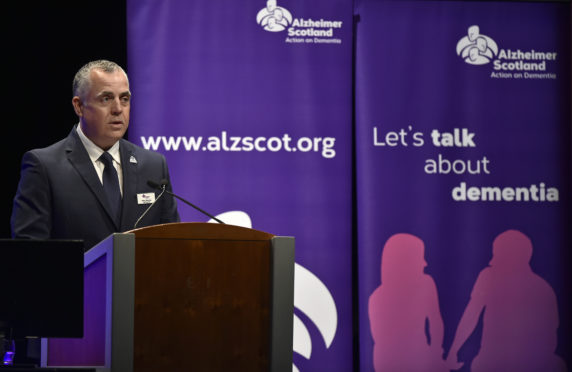
The head of Alzheimer Scotland has called for free care for people living with advanced dementia.
Writing in today’s Sunday Post Henry Simmons, chief executive of Scotland’s leading dementia charity, said the coronavirus pandemic should give new impetus to the campaign to reform dementia care and renewed his call for inequalities in the system to be properly addressed.
He writes: “I suspect many members of the public might not know that, even at the present time, many people with advanced dementia fighting coronavirus in a care home will still have to pay for their care.
“If we ever needed a reason to stop this inequality, coronavirus is it.”
It’s estimated over 60% of Scotland’s care home population have dementia. Almost half of the deaths linked to coronavirus in Scotland have involved care home residents.
But Mr Simmons urged people to look beyond the numbers, adding: “The way coronavirus has affected those in a care setting has been one of the most agonising and difficult themes of this pandemic.”
‘Dementia care must be free at the point of delivery. It is fair, it is right and it is overdue’ – Henry Simmons
For those fortunate enough not to have been touched personally by coronavirus, the pandemic is a story told mainly in numbers.
Every day in the UK we hear hundreds more have died, thousands have contracted the virus. The worldwide case toll is measured in millions, with hundreds of thousands of deaths.
Then there’s the all-important transmission or “R” rate which the scientists say must be kept under one.
The statistics tell us about the scale. What they do not begin to describe is the human cost.
Tomorrow marks the start of Dementia Awareness Week in Scotland and, like many charities, we’d usually mark this by getting together as a community to raise awareness of dementia, campaign for change and promote our support.
As with almost everything, this year will be different. Instead we will be asking you to keep in mind the incredible sacrifices made by those living with dementia and their carers and families.
Around 60% of the people in Scottish care homes are living with dementia. We know so many of them are experiencing high levels of distress due to the current restrictions and changes to their routine.
Don’t think about the raw numbers, though – think about the fear, the loneliness, the isolation people with dementia are experiencing during their last moments.
Think of the families kept agonisingly apart from a beloved family member, or not able to mourn or grieve properly.
The way coronavirus has affected those in a care setting has been one of the most agonising and difficult themes of this pandemic. The rights and wrongs will be debated for years to come.
For now, we must pay tribute to those in the care workforce, who show such bravery, compassion and understanding in the face of conditions which no worker would ever have expected to endure.
There are urgent priorities. Like supporting our carers, often family members, providing round-the-clock care to people with dementia at home, unable to see loved ones or seek respite.
We also have a duty to support those carers whose loved ones are in care homes, devastatingly unable to spend quality time together. Similarly, providing new and alternative ways to support people with dementia and doing all we can to make sure they do not face this alone.
In our 2019 Fair Dementia Care report, we highlighted that people with advanced dementia do not receive the healthcare to which they should be entitled. They instead face significant social care charges. We stipulated a clear need for increased access to healthcare professionals and, most importantly, that people with dementia or their families should not be asked to pay for this care.
Put simply, their care should be free at the point of delivery, in line with those who have other progressive terminal illnesses. I suspect many members of the public might not know that, even at present, many people with advanced dementia fighting coronavirus in a care home will still have to pay for their care.
If we ever needed a reason to stop this inequality, coronavirus is it. Reforming this system must be the bedrock of our recovery, and it should start now.
Dementia Awareness Week is always our opportunity to recognise the people we support.
Now, more than ever, I am humbled by those with dementia and their carers who are facing the most difficult of times.
We dedicate this week to them, and hope Sunday Post readers keep them in mind, too.

Enjoy the convenience of having The Sunday Post delivered as a digital ePaper straight to your smartphone, tablet or computer.
Subscribe for only £5.49 a month and enjoy all the benefits of the printed paper as a digital replica.
Subscribe